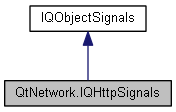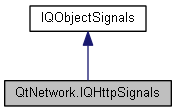|
Qyoto
4.0.5
Qyoto is a C# language binding for Qt
|
|
Qyoto
4.0.5
Qyoto is a C# language binding for Qt
|


Public Member Functions | |
| void | StateChanged (int arg1) |
| | |
| void | ResponseHeaderReceived (QHttpResponseHeader resp) |
| | |
| void | ReadyRead (QHttpResponseHeader resp) |
| | |
| void | DataSendProgress (int arg1, int arg2) |
| | |
| void | DataReadProgress (int arg1, int arg2) |
| | |
| void | RequestStarted (int arg1) |
| | |
| void | RequestFinished (int arg1, bool arg2) |
| | |
| void | Done (bool arg1) |
| | |
| void | ProxyAuthenticationRequired (QNetworkProxy proxy, QAuthenticator arg2) |
| | |
| void | AuthenticationRequired (string hostname, ushort port, QAuthenticator arg3) |
| | |
| void | SslErrors (System.Collections.Generic.List< QSslError > errors) |
| | |
 Public Member Functions inherited from QtCore.IQObjectSignals Public Member Functions inherited from QtCore.IQObjectSignals | |
| void | Destroyed (QObject arg1) |
| void | Destroyed () |
| | |
| void QtNetwork.IQHttpSignals.AuthenticationRequired | ( | string | hostname, |
| ushort | port, | ||
| QAuthenticator | arg3 | ||
| ) |
This signal can be emitted when a web server on a given hostname and port requires authentication. The authenticator object can then be filled in with the required details to allow authentication and continue the connection.
Note: It is not possible to use a QueuedConnection to connect to this signal, as the connection will fail if the authenticator has not been filled in with new information when the signal returns.
This function was introduced in Qt 4.3.
See also QAuthenticator and QNetworkProxy.
| void QtNetwork.IQHttpSignals.DataReadProgress | ( | int | arg1, |
| int | arg2 | ||
| ) |
This signal is emitted when this object reads data from a HTTP server to indicate the current progress of the download.
done is the amount of data that has already arrived and total is the total amount of data. It is possible that the total amount of data that should be transferred cannot be determined, in which case total is 0.(If you connect to a QProgressBar, the progress bar shows a busy indicator if the total is 0).
Warning: done and total are not necessarily the size in bytes, since for large files these values might need to be "scaled" to avoid overflow.
See also dataSendProgress(), get(), post(), request(), and QProgressBar.
| void QtNetwork.IQHttpSignals.DataSendProgress | ( | int | arg1, |
| int | arg2 | ||
| ) |
This signal is emitted when this object sends data to a HTTP server to inform it about the progress of the upload.
done is the amount of data that has already arrived and total is the total amount of data. It is possible that the total amount of data that should be transferred cannot be determined, in which case total is 0.(If you connect to a QProgressBar, the progress bar shows a busy indicator if the total is 0).
Warning: done and total are not necessarily the size in bytes, since for large files these values might need to be "scaled" to avoid overflow.
See also dataReadProgress(), post(), request(), and QProgressBar.
| void QtNetwork.IQHttpSignals.Done | ( | bool | arg1 | ) |
This signal is emitted when the last pending request has finished; (it is emitted after the last request's requestFinished() signal). error is true if an error occurred during the processing; otherwise error is false.
See also requestFinished(), error(), and errorString().
| void QtNetwork.IQHttpSignals.ProxyAuthenticationRequired | ( | QNetworkProxy | proxy, |
| QAuthenticator | arg2 | ||
| ) |
This signal can be emitted when a proxy that requires authentication is used. The authenticator object can then be filled in with the required details to allow authentication and continue the connection.
Note: It is not possible to use a QueuedConnection to connect to this signal, as the connection will fail if the authenticator has not been filled in with new information when the signal returns.
This function was introduced in Qt 4.3.
See also QAuthenticator and QNetworkProxy.
| void QtNetwork.IQHttpSignals.ReadyRead | ( | QHttpResponseHeader | resp | ) |
This signal is emitted when there is new response data to read.
If you specified a device in the request where the data should be written to, then this signal is not emitted; instead the data is written directly to the device.
The response header is passed in resp.
You can read the data with the readAll() or read() functions
This signal is useful if you want to process the data in chunks as soon as it becomes available. If you are only interested in the complete data, just connect to the requestFinished() signal and read the data then instead.
See also get(), post(), request(), readAll(), read(), and bytesAvailable().
| void QtNetwork.IQHttpSignals.RequestFinished | ( | int | arg1, |
| bool | arg2 | ||
| ) |
This signal is emitted when processing the request identified by id has finished. error is true if an error occurred during the processing; otherwise error is false.
See also requestStarted(), done(), error(), and errorString().
| void QtNetwork.IQHttpSignals.RequestStarted | ( | int | arg1 | ) |
This signal is emitted when processing the request identified by id starts.
See also requestFinished() and done().
| void QtNetwork.IQHttpSignals.ResponseHeaderReceived | ( | QHttpResponseHeader | resp | ) |
This signal is emitted when the HTTP header of a server response is available. The header is passed in resp.
See also get(), post(), head(), request(), and readyRead().
| void QtNetwork.IQHttpSignals.SslErrors | ( | System.Collections.Generic.List< QSslError > | errors | ) |
Forwards the sslErrors signal from the QSslSocket used in QHttp. errors is the list of errors that occurred during the SSL handshake. Unless you call ignoreSslErrors() from within a slot connected to this signal when an error occurs, QHttp will tear down the connection immediately after emitting the signal.
This function was introduced in Qt 4.3.
See also QSslSocket and QSslSocket::ignoreSslErrors().
| void QtNetwork.IQHttpSignals.StateChanged | ( | int | arg1 | ) |
This signal is emitted when the state of the QHttp object changes. The argument state is the new state of the connection; it is one of the State values.
This usually happens when a request is started, but it can also happen when the server closes the connection or when a call to close() succeeded.
See also get(), post(), head(), request(), close(), state(), and State.